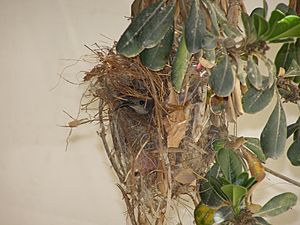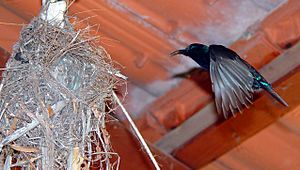Palestine sunbird facts for kids
Quick facts for kids Palestine sunbird |
|
|---|---|
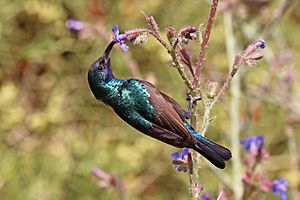 |
|
| Male | |
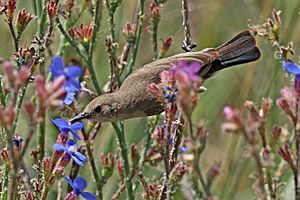 |
|
| both C. o. osea Dana Biosphere Reserve, Jordan |
|
| Conservation status | |
| Scientific classification |
|
| Kingdom: | Animalia |
| Phylum: | Chordata |
| Class: | Aves |
| Order: | Passeriformes |
| Family: | Nectariniidae |
| Genus: | Cinnyris |
| Species: |
C. osea
|
| Binomial name | |
| Cinnyris osea (Bonaparte, 1856)
|
|
| Script error: The function "autoWithCaption" does not exist. | |
| Synonyms | |
|
Cinnyris oseus |
|
Script error: No such module "Check for conflicting parameters".
The Palestine sunbird (Cinnyris osea) is a small type of bird from the sunbird family. You can find it in parts of the Middle East and Africa south of the Sahara Desert. It is also known as the orange-tufted sunbird. In 2015, it was chosen as the national bird of Palestine.
Contents
What Does the Palestine Sunbird Look Like?
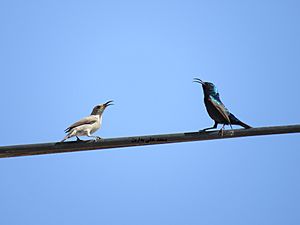
The Palestine sunbird is a small bird, about 8 to 12 centimeters (3 to 5 inches) long. Its wings can spread out 14 to 16 centimeters (5.5 to 6.3 inches). Male sunbirds weigh about 7.6 grams, and females are a bit lighter at 6.8 grams.
Beak and Feathers
This bird has a fairly long, black beak that curves downwards. The feathers of male sunbirds during mating season are mostly dark. However, they look shiny blue or green when the light hits them. They also have small orange tufts (like little puffs) on the sides of their chest. These tufts are hard to see unless you are very close.
Female sunbirds and young birds are grey-brown on their backs. Their undersides are pale. Males who are not in the mating season look similar to females. They might still have some dark feathers.
Sounds and Calls
The Palestine sunbird has a high, fast, and jingling song. It also makes different calls, including a loud alarm call when it senses danger.
Where Does the Palestine Sunbird Live?
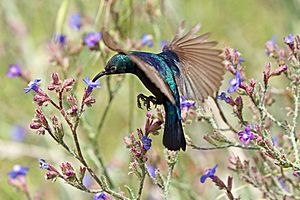
These birds live in places that are warm and dry. They can be found from sea level up to high mountains (3200 meters or about 10,500 feet). They like dry woodlands, bushy areas, wadis (dry riverbeds), savannas (grassy plains), fruit orchards, and gardens. In some towns, like Tel Aviv, they are very common and easy to spot.
Geographic Range
The type of Palestine sunbird found in the Middle East is called C. o. osea. It breeds in Israel, the Palestinian territories, and Jordan in the north. It also lives further south through western Saudi Arabia to Yemen and Oman. In recent years, it has started living in the Sinai Peninsula in Egypt. Some birds travel to Lebanon and Syria in winter, and they have even bred in Lebanon.
Another type, called C. o. decorsei, lives in Africa. You can find it in specific spots in Sudan, north-west Uganda, the Central African Republic, north-east Democratic Republic of Congo, and northern Cameroon.
What Do Palestine Sunbirds Eat?
Palestine sunbirds mainly eat insects and nectar from flowers. They have a long tongue with a brush-like tip. This special tongue helps them reach deep inside flowers to get the sweet nectar.
Reproduction and Life Cycle
The nest of a Palestine sunbird looks like a small purse. It hangs from a branch in a tree or bush. The nest is about 18 centimeters (7 inches) long and 8 centimeters (3 inches) wide at the bottom.
Building the Nest and Laying Eggs
The birds build their nests using leaves, grass, and other plant materials. They hold it all together with hair and spider webs. The inside of the nest is soft, lined with wool and feathers.
Female sunbirds usually lay one to three smooth, shiny eggs. The eggs can vary in color, but they are often white or grey with faint marks on the wider end. The female bird sits on the eggs to keep them warm for about 13 to 14 days.
Chicks and Fledging
When the young birds hatch, they are covered in soft downy feathers. They have an orange-red mouth. The baby birds stay in the nest for 14 to 21 days before they are ready to fly on their own. This is called fledging.
See also
 In Spanish: Suimanga palestino para niños
In Spanish: Suimanga palestino para niños
 | Ernest Everett Just |
 | Mary Jackson |
 | Emmett Chappelle |
 | Marie Maynard Daly |



